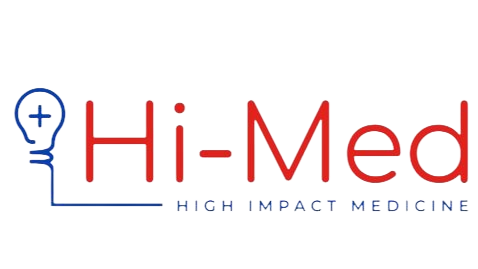
Frequently asked questions
-
High Impact Medicine (Hi-Med) is a global non-profit organisation helping medical students and doctors do the most good they can with their careers.
-
Akhil Bansal and Abe Tolley founded High Impact Medicine in November 2021.
-
A common reason for becoming a doctor is the desire to help people. To help people live healthy lives and to alleviate disease and suffering.
These efforts are thwarted by complex problems facing humanity - climate change, poverty, conflict, inequitable education and global health disparities - all of which intersect with and directly affect human health and well-being. Some health risks, such as man-made pandemics, even threaten the very survival of our species.
Despite the importance of these problems, several areas within them remain significantly neglected and urgently need more talented and skilled people to work on them. Focus areas such as biosecurity, non-profit entrepreneurship, health policy, technology in medicine, science communication and mental health need to attract highly competent individuals.
The challenge we seek to address is the neglect of complex and pressing problems that affect the happiness, well-being and health of billions of people where doctors are well placed to be able to contribute effectively.
We believe that doctors are particularly well placed to help because, in addition to their expertise in health and well-being, they're used to working under high pressure, can quickly find practical solutions to complex problems, and are trained to think scientifically.
-
Our organisation aims to bridge this gap by educating doctors and medical students about how they can use their skills and experience to help solve the world's most pressing problems at the intersection of health and well-being and by empowering them to do so by connecting them to organisations, mentors and resources.
We guide doctors to their most impactful career paths and support them along the way.
Ultimately, by encouraging talented people to work on neglected pressing global problems, the impact of our organisation into the future could be positively affecting the lives of millions or billions of people. -
Our current working definition of doing good/positive impact is “reducing the suffering of humans and animals (regardless of their location, now and in the future) and protecting their lives, without sacrificing anything that might be of comparable moral importance.”
-
We believe that a relevant percentage of people pursuing a career in medicine are doing so based on a profound and intrinsic human desire to help others. If this is your goal, would it not be rational to aim to help as many as possible with the given resources?
-
We are building a thriving global community of impact-driven medical professionals empowering each other to maximise the good done with their careers. We are also continuously working on a learning and support platform that provides the best tools and insights and enables productive discussions to figure out collaboratively how to do the most good with a medical background.
Among other things, we currently offer:
An 8-week introductory fellowship - discover & learn about different high-impact cause areas and ways to contribute
A 4-week career planning fellowship - think about and discuss your personal career path, your strengths, uncertainties and actionable next steps
A Mentorship Programme - be paired with someone already working in a high-impact field
1on1 career coaching
An accountability buddy program
An active community, both online and, at least in some countries, in person
Content, such as cause area summaries on our blog, podcast episodes, speaker events, etc
Furthermore, we’re highlighting jobs, internships and other potentially impactful opportunities on our Slack channel. And we will give our best to put you in contact with relevant people and organisations.
-
There are several things you can do in your free time if you are interested in increasing your positive impact. This can be through donating time or money to effective causes or by building relevant skills and career capital that will put you in a better position to move towards a higher impact career should you want to do so.
You can donate to effective charities, such as through the Giving What We Can Pledge. You can also donate some of your time by working on impactful side-projects, such as working or volunteering for an effective charity (for example, you can find collaborators in the Hi-Med community or beyond it on dashboards such as Impact CoLabs). You can also engage with a number of learning opportunities to build relevant skills and career capital.
-
We are informed and inspired by several philosophies of doing good. We believe it is crucial to see the world as clearly as possible to be able to tackle big problems. Therefore, we strive for a scout mindset and for using scientifically rigorous evidence and reason to decide how to do the most good with limited resources. One framework that helps us identify where best to direct those resources is the importance, neglectedness, and tractability framework of effective altruism. The four principles of medical ethics by Beauchamp and Childress also guide our philosophy: autonomy, beneficence, non-maleficence and justice. You can read more about our values and our approach here.
-
Of the philosophical approaches that guide Hi-Med, the effective altruism philosophy is also associated with a global movement of people who work inspired by similar ideas under the umbrella term ‘Effective Altruism.’ We are inspired by parts of the effective altruism philosophy directly and share parts of their values indirectly, like the scientific mindset and collaborative spirit.
Some of our members consider themselves part of the EA movement, and some don't. We welcome anyone whose values align with our values and who strives to have more positive impact with their medical background, regardless of whether they identify with the EA movement or not. We are not an effective altruism organisation, but we consider ourselves part of the broader EA community. Many organisations in our network identify as effective altruism-inspired organisations, and you will find us giving talks at conferences organised by the EA movement but also at other; non-EA-related conferences and summits.
We are excited to foster a diverse and inclusive community which is not tied to a specific movement or value system. Hi-Med has its own approach to positive impact, grounded in scientific thinking and medical values, that is free to evolve independently as we change our thinking in light of new evidence.

